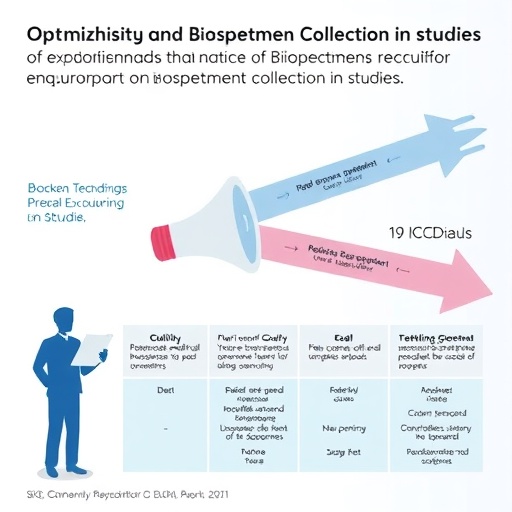In the realm of biomedical research, the dynamics of recruitment and biospecimen collection have long been pivotal to the success of translational observational studies. Recent findings by Devoy, McLaughlin, Cronin, and their team underscore the complexities and operational determinants that influence these critical processes. Their extensive multi-site comparative analysis reveals insights that could transform how research teams approach participant engagement and biospecimen logistics.
The research emphasizes that recruitment strategies are not uniform; they need to be tailored to fit the unique context of each study site. Variations in local population demographics, healthcare infrastructures, and cultural attitudes toward research participation play significant roles in determining recruitment outcomes. For instance, what works effectively in one geographic area may not yield the same success in another. This realization prompts a deeper examination of the strategies employed to resonate with diverse populations, ensuring inclusivity while addressing ethical considerations in participant engagement.
Equally crucial is the factor of patient trust. The researchers found that building rapport with potential participants significantly influences their willingness to join a study. This trust is cultivated through transparent communication and ethical considerations regarding the use of biospecimens. Participants are increasingly aware of their rights and the implications of their contributions, prompting researchers to become advocates for informed consent and ethical oversight. Effectively educating potential participants about the benefits and potential risks of involvement is now seen as a fundamental component of the recruitment process.
The study also suggests that logistical considerations surrounding biospecimen collection can either facilitate or hinder the success of observational studies. Effective biobanking requires meticulous planning, from the moment a participant consents to the moment their samples are collected, processed, and stored. The operational aspects include ensuring that collection procedures are user-friendly and efficient to minimize participant burden. This is crucial for maintaining participant engagement, as any perceived inconvenience can deter involvement in future studies.
Furthermore, the researchers identified technology’s role in modern biospecimen collection and recruitment initiatives. Digital platforms, mobile applications, and telemedicine have revolutionized how researchers interact with potential participants. For instance, digital outreach can significantly increase the pool of volunteers, enabling researchers to cast a wider net and identify suitable candidates more effectively. The findings suggest that harnessing technology not only enhances engagement but can also streamline the biospecimen collection process, ultimately improving data quality.
Interestingly, the comparative analysis revealed a number of operational challenges that were common across multiple sites. From regulatory hurdles to differences in institutional policies, these challenges can pose significant barriers to effective recruitment and biospecimen sourcing. The study team emphasizes the need for harmonization of protocols and policies across research sites to mitigate these issues. Establishing standardized procedures would not only enhance operational efficiency but also promote consistency in data collection and reporting.
In addition to operational challenges, the research highlights the importance of cross-site collaboration. Collaborative efforts among institutions can lead to shared best practices that enhance recruitment efforts. The pooling of resources, knowledge, and experiences can create a more robust framework for conducting translational studies. Such collaboration can promote a culture of learning, leading to the continuous improvement of strategies that engage participants and facilitate biospecimen collection.
Moreover, the study also indicates that researchers must be vigilant about the evolving landscape of regulations surrounding biomedical research. Recent shifts in policies related to informed consent and data protection necessitate ongoing training and education for research teams. Adapting to these changes is crucial for maintaining participant trust and ensuring compliance with ethical standards. Failure to navigate these regulatory waters can result in delays, increased costs, and potential loss of participant engagement.
Equally vital is the analysis of participant demographics post-recruitment. Understanding who is participating in studies—and who is not—can provide insights into how recruitment efforts can be refined. The study urges researchers to conduct regular assessments of recruitment outcomes, evaluating the effectiveness of different strategies across various demographic groups. By identifying gaps in representation, the research community can strive to improve inclusivity in future studies.
The implications of these findings extend beyond mere academic interest; they signal a call to action for the broader biomedical community. Researchers, institutional review boards, and regulatory bodies must collaborate to create an environment that fosters successful recruitment and the ethical collection of biospecimens. Only through collective efforts can the barriers to engagement be adequately addressed, paving the way for innovation in translational medicine.
In reflecting on the future of translational observational studies, it is clear that the operational determinants identified in this research are foundational to driving impactful discoveries. A nuanced understanding of recruitment and biospecimen collection will be essential for leveraging the full potential of observational research. Ultimately, the convergence of science, ethics, and community engagement will determine the trajectory of future translational studies as they respond to public health challenges.
In conclusion, the findings of Devoy et al. provide a significant contribution to the discourse on recruitment and biospecimen collection in translational studies. As the research landscape continues to evolve, the insights gained from this multi-site comparative analysis will serve as a roadmap for enhancing engagement strategies, refining operational protocols, and fostering trust with participants. With a dedicated focus on addressing these operational determinants, the biomedical research community can unlock the potential of observational studies to advance medical knowledge and improve patient outcomes.
Subject of Research: Recruitment and biospecimen collection in translational observational studies
Article Title: Operational determinants of recruitment and biospecimen collection in translational observational studies: a multi-site comparative analysis
Article References:
Devoy, C., McLaughlin, R.A., Cronin, C. et al. Operational determinants of recruitment and biospecimen collection in translational observational studies: a multi-site comparative analysis.
J Transl Med 23, 1075 (2025). https://doi.org/10.1186/s12967-025-07074-1
Image Credits: AI Generated
DOI: 10.1186/s12967-025-07074-1
Keywords: recruitment, biospecimen collection, translational studies, observational research, participant engagement, operational determinants, ethics, collaborative efforts, technology in research.




